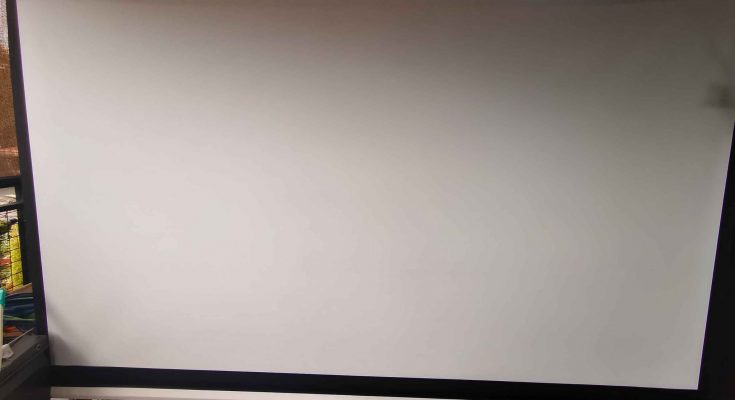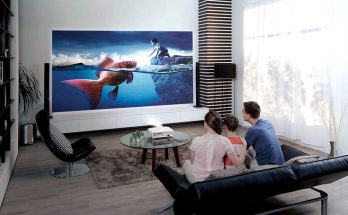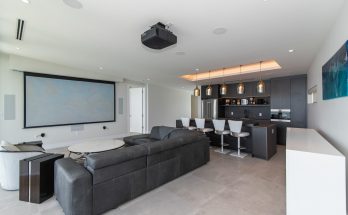Black and white projector screens are the two most basic colors on the market today. Although black screens have become quite widespread and occupy more soldiers in the market, white screens still carry the common standard characteristics of a projector screen.
One factor can be the abundance of white screens. Which is preferable, on a logical level, a black projector screen vs. a white projector screen? That is why we’ve tested features like color contrast, image sharpness, and reflectivity. Follow along with our following article to make the best decision between a black screen and a white screen according to your preferences and needs.
Contents
What Are the Benefits of a Black Projector Screen?
The screens are often black because black can absorb all kinds of light very well due to its characteristics. Therefore, light elements can be displayed with sharp, clear quality. Under normal conditions with whole light, the black screen display can still return the complete picture. From there, they bring a great experience to the user.
The higher the quality of the screen, the more expensive it will probably be. Along with the final restoration at the state-of-the-art screen, we do our best to comfort the user. We will ask the question: “Is the black image worth buying?”. All attachments to the selection and your thoughts.
In addition to investing in the screen, indeed, to have the best experience, you should invest in photos that directly and indirectly affect your experience. If you’re eligible, the following color mural, which should be painted to match the screen, can also be compelling for the occasion. Above all, we still need to remember. A good screen will depend a lot on its quality. Other factors only complement your experience.
Which is better, Black Projector Screen or White?
It’s hard to have a general rule by which we compare and choose between two monitors quickly. Each has its advantages and disadvantages and affects the experience for the user. Of course, what should be noted here is that we should choose the appropriate one for our needs. Below is a breakdown between white screen and black screen. They give the most overview for your choice.
Color Contrast
We have to admit that a high-quality monitor will provide a great experience no matter what type it is. But the difference here is probably not much. The results show that the black screen has better contrast than the white screen.
The black screen has pretty good focus, and you can quickly tell this because the properties of black, light, and dark colors are better balanced. As for the white screen, sometimes the bright colors are blurred, but this does not affect the user experience. Sometimes we will see sparkling effects on your screen.
Light Absorption
The critical point, in essence, is the ability to absorb and reflect light in black and white screens, which makes this difference. On a black screen, most of the light is absorbed. Other than white, a white screen will reflect those lights. Therefore, at any angle on the white screen, users can see the images.
In black screens, the images are amazingly high quality, whether in bright or dark conditions. If you put them in a dark room, their visibility is still good and gives you full viewing angles.
Budget
Not that what works better will be more choice. This proves that many factors directly affect the choice of shoppers. So we will ask the fundamental question: “Why is the white screen preferred over the black screen?”. The most reasonable answer is the difference in cost and investment costs when buying a white screen. When using a white screen, we can have many choices in terms of models and prices. They are available in all price segments. This makes selection easy for users.
Black screens have many choices in quality and design, but what they all have in common is a very high price. They cost over $1000. So, with a mid-range budget and usage needs, surely a white screen will be the first choice when buying.
FAQs
Is a projector screen preferable to a bare wall?
A screen delivers the best possible quality and definition. The issue is light reflection, and a wall cannot compete with that of a screen. The ideal way to reflect light is to have an ultra-smooth surface. As most walls contain defects, fractures, or lumps, projection screens are significantly preferable in this regard.
Can I project onto a grey screen using a projector?
“Will a projector function on grey or black screens?” is a simple yes or no question. A white screen is a fantastic option if you intend to use a projector inside or in a room with much light. To display an image, the projector’s light must be reflected onto the picture screen.
Is it true that looking at a black screen is better for your eyes than a white one?
The dark mode can help you avoid eye strain in low-light circumstances. Total contrast (white on black) might be challenging to read and put additional strain on the eyes. Reading large amounts of text can be difficult when using a light-on-dark theme.
Can a black screen be used instead of a green one?
Because that particular shade of green and blue isn’t seen in nature, it can be used for various themes. The primary concept is to keep your backdrop color as far away from your subject as possible. Any hue can technically be utilized as long as it isn’t too close to the topic.
Conclusion
The above all analyzes the difference when choosing between two black and white screens. Of course, in good product quality, the differences between these two screens are almost negligible. Indeed, they do not have much difference when choosing. On the other side, it’s your choice to select a product that you dream of owning and fits your budget.





